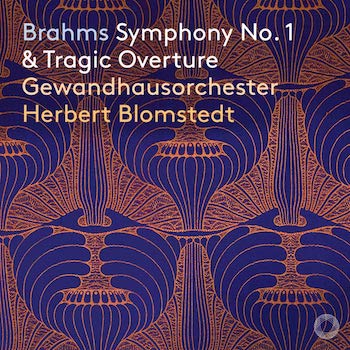Classical CD Reviews: François-Xavier Roth and Schumann, Herbert Blomstedt and Brahms, and Daniel Barenboim and Elgar
By Jonathan Blumhofer
François-Xavier Roth and his Gürzenich-Orchester Köln deliver a must-have cycle of Robert Schumann’s symphonies; Herbert Blomstedt’s Brahms’s Symphony no. 1 is spacious, restrained, and – too often – dull; Daniel Barenboim’s latest Elgar installment features a regrettably unsung masterpiece.
 François-Xavier Roth and his Gürzenich-Orchester Köln (GOK) deliver some fresh and spunky performances in this installment of what one hopes turns into a must-have cycle of Robert Schumann’s symphonies. In it, Roth’s penchant for snappy tempos and lean textures brings out the best in his orchestra – and, in so doing, they let Schumann’s orchestral writing shine.
François-Xavier Roth and his Gürzenich-Orchester Köln (GOK) deliver some fresh and spunky performances in this installment of what one hopes turns into a must-have cycle of Robert Schumann’s symphonies. In it, Roth’s penchant for snappy tempos and lean textures brings out the best in his orchestra – and, in so doing, they let Schumann’s orchestral writing shine.
In the “Spring” Symphony (no. 1), the opening movement comes together with conspicuous energy, its introduction clean and edgy, the Allegro proper marked by directed playing of impressive articulative detail. The slow second movement is warmly shaped while the third-movement Scherzo’s rhythms are taut. In the finale, Roth draws out some radiant low brass playing from his forces; its coda is viscerally ebullient.
Filling out the disc is the 1841 version of the Symphony no. 4. Again, clean textures, purposeful tempos, and a close attention to the score’s nuances result in a highly energized reading of the symphony’s first movement (just listen to those jarring string trills in the development).
The second forms a stark, plaintive contrast – especially during the outer thirds – though the violin solo over the central, majore section provides a welcome glow. Roth and the GOK give a flexible account of the fiery third movement, while the finale is fresh, lively, and clean – capped by a whirling, thrilling coda.
Programatically, theirs is a smart pairing: the “Spring” Symphony and this original version of the Fourth were written within a few months of each other. But, much more than that, these are exciting, confident performances that are simply a joy to take in – don’t miss ’em.

Herbert Blomstedt has been, over the last couple of years, one of the most engaging maestros I’ve caught in live performance: the picture he presents of purpose, energy, and insightful musicianship belies his 93 years. Yet Blomstedt’s new recording of Johannes Brahms’s Symphony no. 1, the first volume of a forthcoming full-symphony survey with the Gewandhausorchester Leipzig, is anything but energetic or driven.
On the contrary, it’s spacious, restrained, and – too often – dull.
Blomstedt’s approach to the first movement, for instance, emphasizes the music’s melancholy lyricism. Perhaps there’s something to be said for such a tack – the Gewandhausorchester, after all, sounds wonderful. But it comes at the price of any sense of struggle, tension, or forcefulness that lies behind the notes. The result is a turgid (and rather sluggish) account of one of the most dramatic symphonic movements in the 19th-century canon.
The second movement sings a bit more – the high-string passages are gorgeous and the offbeat rhythmic intricacies underneath the woodwind solos emerge with remarkable clarity – but there’s not much to commend the lilting third or most of the finale.
In the latter, rich orchestral sonorities don’t compensate for a lack of emotional fire and, as the movement proceeds, what little life there is to be had drains away on the reiterations of the famous main theme. Only when the coda arrives does Blomstedt suddenly flip a switch: this is as electrifying and burnished a 90-second clip of Brahms as you’ll hear anywhere. Does it make up for the previous 49 minutes of the Symphony? Not at all. But it is a splendid capper.
Better is his reading of the Tragic Overture that fills out the disc. Here, tempos are fresh and lively, plenty of rhythmic energy is to be had, and the Gewandhausorchester’s multihued tonal palate proves bracing (the ensemble’s blend of instrumental families is hard-to-beat).
In all, then, a bit of a misfire, though beautifully played and – as always with Pentatone – flawlessly recorded.
 Daniel Barenboim’s latest Elgar installment with the Staatskapelle Berlin pairs the song cycle Sea Pictures with the 1913 tone poem Falstaff.
Daniel Barenboim’s latest Elgar installment with the Staatskapelle Berlin pairs the song cycle Sea Pictures with the 1913 tone poem Falstaff.
The latter is a bit of an obscurity, at least on the concert stage, though it’s been widely recorded. Barenboim’s present reading abounds in character and a command of Elgar’s style that’s dazzling – even if it doesn’t ultimately elevate the score above its rather humdrum material.
Even so, this Falstaff captures the modernist, Straussian element of Elgar’s mature writing well: the brilliant, inventive orchestrations; dazzling counterpoint; impish wit; and so forth. The Staatskapelle’s playing is very carefully balanced – all of the music’s moving parts speak clearly – yet consistently full-bore and impressively agile. Prince (later King) Henry’s nobilamente tune – probably Falstaff’s finest lick – soars; the King’s “Progress” near the end snaps nicely.
Also, the music’s quiet moments come out delicately: the “Dream Interlude” is wistful and tender, while the string portamentos in the Gloucestershire interlude lend a beguiling character to the proceedings (as they also do in the work’s coda).
In Sea Pictures, Barenboim’s joined by the Latvian mezzo-soprano Elīna Garanča. Her take on the cycle’s sometimes-wordy texts are never short of vibrant and polished: diction is consistently clean, tone lush, and the low notes – particularly those in the opening “Sea Slumber Song” – gleam like polished bronze.
Indeed, one of the highlights of Garanča’s performance is the contrast between the vocal registers: the apotheosis of the central “Sabbath Morning at Sea,” for instance, is a moment of tremendous release. So, too, the climax of the concluding “The Swimmer.”
Tempos, though, vary widely: “Sea Slumber Song,” “In Haven,” and “Where Corals Lie” flow naturally (the latter offers a notably shimmery blend between voice and solo cello). But “Sabbath Morning at Sea” and “The Swimmer” are, on the whole, too broad. The start-stop quality to phrasing found in both undermines what is, otherwise, a richly played account of this regrettably unsung masterpiece.
Jonathan Blumhofer is a composer and violist who has been active in the greater Boston area since 2004. His music has received numerous awards and been performed by various ensembles, including the American Composers Orchestra, Kiev Philharmonic, Camerata Chicago, Xanthos Ensemble, and Juventas New Music Group. Since receiving his doctorate from Boston University in 2010, Jon has taught at Clark University, Worcester Polytechnic Institute, and online for the University of Phoenix, in addition to writing music criticism for the Worcester Telegram & Gazette.
Tagged: Daniel Barenboim, Decca, Francois-Xavier Roth, Herbert Blomstedt, Myrios Classics

I quote from the review of Sea Pictures: “this regrettably unsung masterpiece” – Hmm, I must say I find this comment on Sea Pictures somewhat bemusing. I have a couple of CDs and 5 downloads of this – a special favourite of mine. Gladys Ripley actually recorded it twice. Of course, I consider it a masterpiece, too…. There is also a live by Janet Baker – recorded after the renowned EMI version.